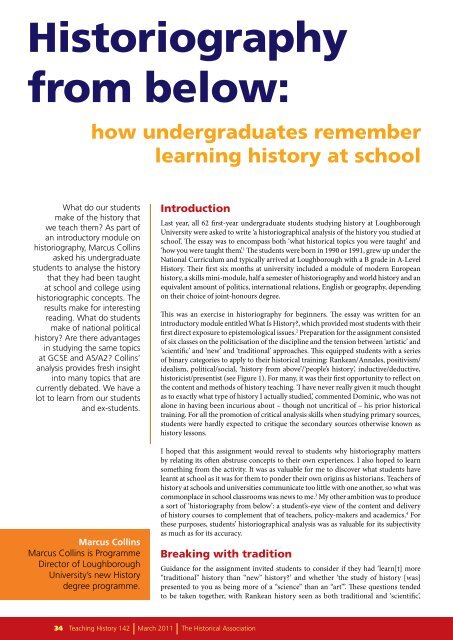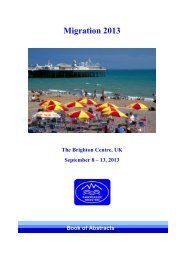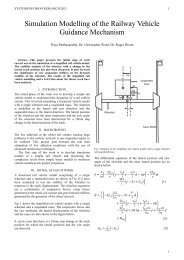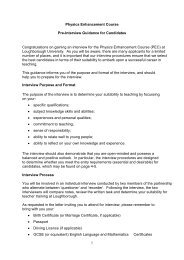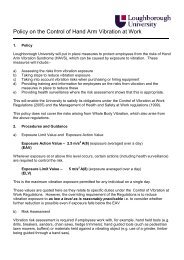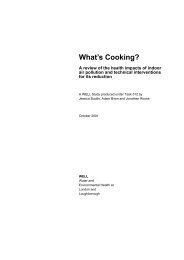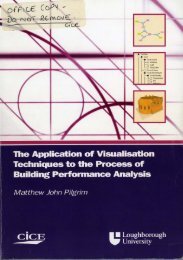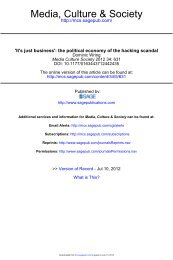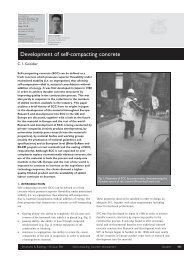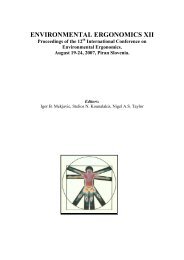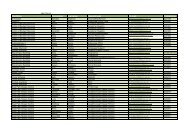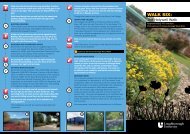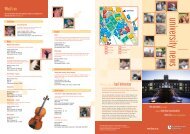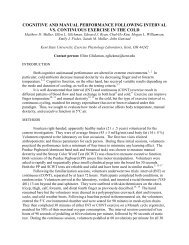Historiography from Below.pdf - Loughborough University
Historiography from Below.pdf - Loughborough University
Historiography from Below.pdf - Loughborough University
Create successful ePaper yourself
Turn your PDF publications into a flip-book with our unique Google optimized e-Paper software.
<strong>Historiography</strong><br />
<strong>from</strong> below:<br />
how undergraduates remember<br />
learning history at school<br />
What do our students<br />
make of the history that<br />
we teach them? As part of<br />
an introductory module on<br />
historiography, Marcus Collins<br />
asked his undergraduate<br />
students to analyse the history<br />
that they had been taught<br />
at school and college using<br />
historiographic concepts. The<br />
results make for interesting<br />
reading. What do students<br />
make of national political<br />
history? Are there advantages<br />
in studying the same topics<br />
at GCSE and AS/A2? Collins’<br />
analysis provides fresh insight<br />
into many topics that are<br />
currently debated. We have a<br />
lot to learn <strong>from</strong> our students<br />
and ex-students.<br />
Marcus Collins<br />
Marcus Collins is Programme<br />
Director of <strong>Loughborough</strong><br />
<strong>University</strong>’s new History<br />
degree programme.<br />
Introduction<br />
Last year, all 62 first-year undergraduate students studying history at <strong>Loughborough</strong><br />
<strong>University</strong> were asked to write ‘a historiographical analysis of the history you studied at<br />
school’. The essay was to encompass both ‘what historical topics you were taught’ and<br />
‘how you were taught them’. 1 The students were born in 1990 or 1991, grew up under the<br />
National Curriculum and typically arrived at <strong>Loughborough</strong> with a B grade in A-Level<br />
History. Their first six months at university included a module of modern European<br />
history, a skills mini-module, half a semester of historiography and world history and an<br />
equivalent amount of politics, international relations, English or geography, depending<br />
on their choice of joint-honours degree.<br />
This was an exercise in historiography for beginners. The essay was written for an<br />
introductory module entitled What Is History?, which provided most students with their<br />
first direct exposure to epistemological issues. 2 Preparation for the assignment consisted<br />
of six classes on the politicisation of the discipline and the tension between ‘artistic’ and<br />
‘scientific’ and ‘new’ and ‘traditional’ approaches. This equipped students with a series<br />
of binary categories to apply to their historical training: Rankean/Annales, positivism/<br />
idealism, political/social, ‘history <strong>from</strong> above’/‘people’s history’, inductive/deductive,<br />
historicist/presentist (see Figure 1). For many, it was their first opportunity to reflect on<br />
the content and methods of history teaching. ‘I have never really given it much thought<br />
as to exactly what type of history I actually studied,’ commented Dominic, who was not<br />
alone in having been incurious about – though not uncritical of – his prior historical<br />
training. For all the promotion of critical analysis skills when studying primary sources,<br />
students were hardly expected to critique the secondary sources otherwise known as<br />
history lessons.<br />
I hoped that this assignment would reveal to students why historiography matters<br />
by relating its often abstruse concepts to their own experiences. I also hoped to learn<br />
something <strong>from</strong> the activity. It was as valuable for me to discover what students have<br />
learnt at school as it was for them to ponder their own origins as historians. Teachers of<br />
history at schools and universities communicate too little with one another, so what was<br />
commonplace in school classrooms was news to me. 3 My other ambition was to produce<br />
a sort of ‘historiography <strong>from</strong> below’: a student’s-eye view of the content and delivery<br />
of history courses to complement that of teachers, policy-makers and academics. 4 For<br />
these purposes, students’ historiographical analysis was as valuable for its subjectivity<br />
as much as for its accuracy.<br />
Breaking with tradition<br />
Guidance for the assignment invited students to consider if they had ‘learn[t] more<br />
“traditional” history than “new” history?’ and whether ‘the study of history [was]<br />
presented to you as being more of a “science” than an “art”’. These questions tended<br />
to be taken together, with Rankean history seen as both traditional and ‘scientific’,<br />
34<br />
Teaching History 142 March 2011 The Historical Association
Figure 1: Some conceptual oppositions to use when comparing different historical methods<br />
Rankean<br />
The school of history founded by<br />
Leopold von Ranke which advocated<br />
empirical source-criticism, highpolitical<br />
subject-matter and eventdriven<br />
narratives<br />
Positivism<br />
Historians should search for laws<br />
of human behaviour akin to those<br />
governing the natural world<br />
Annales<br />
The school of history originating<br />
in early twentieth-century France<br />
which championed a ‘total’ history<br />
accounting for long-term and largescale<br />
change across entire societies<br />
Idealism<br />
Historians understand the mentality<br />
of their subjects through a process of<br />
empathy<br />
Scientific<br />
History is a robust science; objectivity<br />
is crucial<br />
Artistic<br />
History is a creative and imaginative<br />
enterprise; subjectivity matters<br />
Political<br />
History should focus on the actions of<br />
leaders, politics, governments<br />
Social<br />
History should focus on society,<br />
culture and everyday life<br />
History <strong>from</strong> above<br />
History <strong>from</strong> the perspective of the<br />
elites<br />
People’s history<br />
History <strong>from</strong> the perspective of<br />
ordinary people<br />
Inductive<br />
Historians start with open minds<br />
and build up theories <strong>from</strong> data in<br />
archives<br />
Deductive<br />
Historians should start with theories<br />
and use archival sources to test<br />
them<br />
Historicist<br />
Historians should aim to understand<br />
the past on its own terms and not<br />
judge it<br />
Presentist<br />
We should explore and evaluate<br />
the past <strong>from</strong> the perspective of our<br />
current concerns<br />
Traditional<br />
Rankean, political, empirical history<br />
<strong>from</strong> above<br />
New<br />
History with a more expansive<br />
concept of the sources, subjects and<br />
agents than its traditional counterpart<br />
Teaching History 142 March 2011 The Historical Association 35
in opposition to the New History and its ‘cultural turn’. 5<br />
Furthermore, students often displayed an evolutionary<br />
understanding of their own maturation as historians which<br />
seemed to recapitulate the development of the historical<br />
discipline itself. 6 The ‘listing and reciting’ undertaken by<br />
Lucy at primary school sounded oddly reminiscent of the<br />
obsession with lineage in oral cultures and the earliest<br />
written chronicles, while several others began learning<br />
history as a Thucydidean-type narrative of statesmen and<br />
wars. A certain recapitulation also manifested itself in the<br />
periods under study. Ancient and early medieval history<br />
were essentially left to primary schools, allowing secondary<br />
schools to concentrate on modern history leavened by the<br />
odd Tudor.<br />
Students generally saw ‘traditional’ history to be unchallenging<br />
and as such most appropriate for younger children. ‘Certainly<br />
it is much simpler to teach traditional history rather than new<br />
history and I believe this is the reason that at a lower age,<br />
traditional history is the fundamental way of teaching,’ stated<br />
Chris C. Dan C. likewise contended that ‘a more “traditional”<br />
form of history was taught [at primary school] because it<br />
is simpler to teach the basics in order to understand more<br />
broad history later on.’<br />
Some students also associated the quest for objectivity<br />
in ‘traditional’ history with the rote learning tested by<br />
examinations. Gen recalled that:<br />
Although the way in which we were encouraged to think<br />
about or learn ‘history’ at AS-Level was not prescriptive<br />
or ‘scientific’, the way[s] my teachers encouraged us to<br />
answer exam questions or analyse sources were extremely<br />
scientific. My teachers were ‘training’ my class to get<br />
good exam results, and this meant following the AO’s<br />
[Assessment Objectives] set by the exam board, but also<br />
to a degree following a prescriptive approach to essay<br />
writing, that of: point, evidence, comment.<br />
Matt likewise found that the ‘very “traditional” ... Empiricism’<br />
taught to him prior to sixth form allowed ‘no space for any<br />
different style of interpretation’. Declan Timmins’ A-Level<br />
history course was more regimented still. His school year<br />
was divided into two, with the first half being devoted<br />
to ‘gathering and learning the required information’ and<br />
the second half to ‘practising exam technique by going<br />
through past papers’. The way he learnt to produce a<br />
‘good answer’ militated against him ‘challenging historical<br />
opinion[s] of authors and ... building up [his] own personal<br />
understanding.’ The rigorous testing of arguments with<br />
evidence championed by Ranke was reduced to a formula<br />
for passing exams.<br />
Many pinpointed a shift <strong>from</strong> ‘traditional’ to ‘new’<br />
approaches in their later years at school. The turningpoint<br />
for Lucy came when she entered secondary school<br />
and was exposed to ‘“new” history in action’, represented<br />
by ‘more complex topics, such as social standings and ...<br />
economic influences’. In Nana’s case, ‘the history I knew<br />
began to change’ at GCSE level when encountering ‘the<br />
study of society and the study of groups of people’. But the<br />
most common contrast drawn by students was between the<br />
history they learnt at GCSE and A-Level. ‘GCSE was focused<br />
primarily around learning dates, facts and figures on events<br />
in order to be able to regurgitate them for the exam in the<br />
summer,’ recalled Alex: ‘The emphasis on elites was clear.’<br />
At sixth-form, however, ‘Instead of focusing of the role of<br />
the individual upon history, we focused on the way history<br />
impacted the individual.’<br />
The scope for interpretation struck other A-Level students<br />
as a major departure <strong>from</strong> their previous schooling. Dom’s<br />
teachers had ‘banged’ into him the correct way to write an<br />
essay and to identify ‘the one answer’ to any given question in<br />
earlier years. Yet in sixth-form they taught him that ‘there was<br />
a number of different ways you could answer the question’<br />
and expected him to ‘use evidence to come to [his] own<br />
response’. Nathan H. also came to appreciate that ‘different<br />
historians will obtain varying conclusions’ as an A-Level<br />
student, which led him to reclassify history as more art than<br />
science. So did Dom.<br />
Students who revisited familiar historical topics at A-Level<br />
sometimes experienced epiphanies. Alice had hitherto been<br />
taught about Nazism in a ‘very traditional’ manner which<br />
emphasised ‘specific events and dates’ and Hitler’s role as ‘the<br />
sole driving force of the Nazi regime and Holocaust’. It was<br />
only when reading numerous ‘sources, accounts, statistics<br />
and books on the Nazi regime’ for her A2 coursework that<br />
she ‘developed the “New” History approach’. A changing<br />
understanding of Lenin’s April Theses signalled Fiona’s<br />
graduation <strong>from</strong> ‘traditional’ to ‘new’ history:<br />
When I came to study A level I was told to almost ignore<br />
what I was told at GCSE ... At GCSE level I was told<br />
Lenin came back to Russia to a big crowd of support and<br />
his April Theses were widely accepted and approved of.<br />
In contrast, after doing reading for A-level, [I] found the<br />
situation to be quite different, with Lenin coming back<br />
into Russia to a minimal reception and his April theses<br />
having to be adjusted in many respects to be accepted.<br />
But reconceptualisation of this sort escaped those whose<br />
entire schooling was traditional in its methodology and<br />
subject-matter. ‘Throughout my time at school I have only<br />
been taught traditional history, under the impression that this<br />
is the only way to study history,’ wrote Chris C. ‘Throughout<br />
my school life, history was taught in its traditional sense as<br />
designed by Ranke,’ echoed Tom. Even those who had been<br />
exposed to ‘new’ history at school often considered such<br />
training to have been too little, too late. The reason for their<br />
dismay was that they perceived ‘new’ history to be more<br />
sophisticated and comprehensive due to its multiplication<br />
of themes, sources and interpretations. ‘Traditional’ history’s<br />
focus on politicking by an elite seem narrow by comparison.<br />
‘[T]here is more to life than that, and there is more to history<br />
than that,’ concluded Dan Sharp.<br />
The teaching of British history was singled out for its<br />
traditionalism, with Luke receiving only ‘a small pinch<br />
of economics and general public opinion’ to enliven his<br />
standard high-political diet. ‘Kings and Battles’ particularly<br />
dominated lessons on the Tudors according to Steven,<br />
David and Aimee. Nazi Germany and Soviet Russia were<br />
conversely identified as subjects taught in a ‘total’ history<br />
manner which integrated the social and the political. Katie<br />
36<br />
Teaching History 142 March 2011 The Historical Association
discerned ‘more of a “New” history approach’ in a module<br />
on totalitarianism:<br />
Although we looked at models of the state, we looked at<br />
regimes in a broad sense rather than focusing heavily<br />
on individual political figures, instead they were only<br />
used as supporting evidence to back up our arguments.<br />
This enabled us to consider life under these totalitarian<br />
regimes and the affect [sic] they had on society as a<br />
whole.<br />
Joe similarly studied German history at an ‘individual<br />
everyday person level’, Dominic explored ‘social effects<br />
and changes’ only in reference to Nazism, and Amanda<br />
appreciated the different subject-matter (‘the lives of the<br />
peasants and the economical base’) and sources (‘pictorial<br />
and oral rather than just being purely textual’) in her<br />
module on Russia: From Tsars to Commissars. A welcome<br />
by-product of the over-teaching of Hitler and Stalin is that<br />
students study a single subject in sufficient depth for them<br />
to become exposed to its historiographical debates. Alice<br />
accordingly became acquainted with the functionalist and<br />
intentionalist approaches and the Browning-Goldhagen<br />
controversy during the last of the ‘three or four times’ she<br />
studied Nazism at school.<br />
Worldviews<br />
The two other issues raised in the guidance for the<br />
assignment – how history teaching was shaped by politics<br />
and the National Curriculum’s avowed goal of ‘promoting<br />
citizenship’ – prompted students to take issue with the<br />
geographical focus of their studies. Notwithstanding<br />
their grisly fascination with Continental dictators, many<br />
students shared Simon’s dissatisfaction that he ‘did not<br />
study any country outside of Europe and America’, thereby<br />
contradicting the National Curriculum’s additional aim<br />
of promoting ‘cultural development’. The neglect of non-<br />
Western history was likewise identified by Meri as a ‘major<br />
flaw’, by Emma as ‘continuing a hierarchy’ that elevated the<br />
West over the rest and by Alice as ‘very bias[ed]’. ‘Looking<br />
back now I am disillusioned by what a small part of history I<br />
studied for such a long time, in the context of world history,’<br />
she wrote, while Steven worried that schoolchildren lacking<br />
a grounding in world history would be ‘terribly unaware of<br />
the complexities and wonders that other nations have to<br />
offer.’ One reason for their dismay about having studied (as<br />
Alice put it) ‘a snippet of knowledge in such a wide historical<br />
spectrum’ was that they were writing this assignment while<br />
taking a module on world history. But this module affected<br />
them so profoundly because they had been hitherto been<br />
taught a curriculum which, when not Eurocentric, was<br />
Americentric in its focus on the US civil rights movement,<br />
Native Americans and the Vietnam War. 7<br />
Nation-state history dominated the learning of the halfdozen<br />
or so students who had been schooled abroad,<br />
especially those <strong>from</strong> newly formed or reformed states.<br />
Nathan C.’s historical training in South Africa ‘promoted<br />
national pride and a support for the new government’ and<br />
Julius found that history lessons in Lithuania were used ‘not<br />
only to teach about the past but also to evoke nationality,<br />
political, social and cultural activity.’ But such agendas also<br />
shaped the curricula in nations which had long ago gained<br />
independence or experienced revolutions. ‘[T]o build greater<br />
nationalism’ was the goal of the French history curriculum<br />
according to Laura Pellerin, which explained why her<br />
compatriot Lisa was taught to value ‘the rights and duties<br />
a citizen is entrusted with in a republican and democratic<br />
state like France’ and not to dwell on unsavoury topics such<br />
as the Algerian War of Independence. And whereas Marie<br />
characterised her instruction in Norwegian history to be<br />
‘very reasonable’ in its ‘sense of national feeling’, Edward<br />
characterised himself as having been ‘blinded by Irish<br />
nationalism’ at school.<br />
Though those educated in Britain experienced a less overtly<br />
national or nationalistic form of schooling, many nonetheless<br />
viewed the privileging of British history to be archaic and<br />
myopic. Their aversion to Anglocentrism casts doubt on<br />
the citizenship agenda which was promoted by the previous<br />
government and seems likely to emerge in a more patriotic<br />
guise under the present one. Students were not generally<br />
opposed to history being taught as civics, the exception being<br />
Josh with his dig at teachers who:<br />
...insisted on making us ‘learn <strong>from</strong> the mistakes of the<br />
past’, seemingly with the intention of making us walk<br />
out of the classroom thinking ‘I must not appropriate<br />
Africans <strong>from</strong> their homeland and sell them for profit<br />
as non-wage labourers to American cotton and tobacco<br />
producers’.<br />
Lucy treasured ‘[t]he moral lessons learnt when studying<br />
about topics such as slavery and Apartheid’, Cameron viewed<br />
the ‘liberal approach adopted by the national curriculum’<br />
to be ‘necessary for multicultural societies to function’ and<br />
Chris K. thought that lessons could be learnt <strong>from</strong> the sorry<br />
history of militarism and nationalism.<br />
Yet students were deeply suspicious of any attempts to<br />
portray British history in Whiggish terms. Britain was ‘always<br />
presented in a positive, patriotic light’ to Fiona, as ‘a country<br />
that would not stand for inequality’ to Gemma and as ‘the<br />
perfect model for a state’ to Steven. They felt misled, much as<br />
Dan Sharp found it ‘incredible’ that younger schoolchildren<br />
were taught to ‘associate concentration camps with Hitler and<br />
the Holocaust, but not Britain and the Boers.’ His point was<br />
a contentious one, but it indicated how students suspected<br />
the National Curriculum to harbour a nationalist bias. Tory<br />
proposals to teach ‘our island story’ might well founder on<br />
a combination of scepticism and boredom. 8<br />
Conclusion<br />
The students who contributed to this study commonly<br />
portrayed themselves as having progressed (especially at<br />
A-Level) <strong>from</strong> perceiving history in a ‘traditional’, ‘scientific’<br />
and Eurocentric fashion to one which emphasised its ‘new’,<br />
‘artistic’ and global aspects. Many criticised the former as<br />
being biased in its subject-matter and simple, even simplistic<br />
in its methodology when compared to the latter’s more<br />
holistic and democratic approach. British history received<br />
poor notices for its traditionalism and parochialism, while<br />
Teaching History 142 March 2011 The Historical Association 37
concerns over the Hitlerisation of the curriculum were<br />
somewhat offset by the subject being taught in a multifaceted<br />
manner with reference to historiographical debate. Few<br />
students objected to the history curriculum including a<br />
moral or civic dimension, but they were quick to denounce<br />
political bias and occasionally viewed the curriculum as<br />
embodying a set of values at odds with their own.<br />
This small study would benefit <strong>from</strong> being replicated<br />
in schools and other universities in order to gauge its<br />
representativeness. Running such exercises provides a means<br />
for students to reflect on their education and play some part<br />
in shaping it. I find it unsettling that even those who proceed<br />
to study history at university express such dissatisfaction with<br />
their education. The privileging of some historical topics over<br />
others left one of them, Dan Sharp, ‘feeling cheated’. ‘Why do<br />
we study what we do?’ he asked. Good question.<br />
REFERENCES<br />
1<br />
Big thanks go to my colleagues Siobhan Lambert-Hurley and Emma Vickers,<br />
who taught alongside me on this module, and to the students whose insights<br />
this article explores.<br />
2<br />
Introductory texts on historiography that we frequently recommend to<br />
students include Iggers, G. (2005) <strong>Historiography</strong> in the Twentieth Century:<br />
From scientific objectivity to the postmodern challenge, rev. edn, Middletown,<br />
Conn.: Wesleyan <strong>University</strong> Press; Kramer, L. and Maza, S. (eds) (2006) A<br />
Companion to Western Historical Thought, Oxford: Blackwell; and Tosh, J.<br />
(2010) The pursuit of history, rev. edn, Harlow: Pearson Longman.<br />
3<br />
For the relationship between history taught at schools and universities, see the<br />
proceedings of two conferences hosted by the Institute of Historical Research<br />
in 2005 (available at www.history.ac.uk/resources/history-in-british-education;<br />
accessed on 9 February 2011); Booth, A. (2005) ‘Worlds in collision: <strong>University</strong><br />
tutor and student perspectives on the transition to degree-level history’ in<br />
Teaching History, 121, pp. 14-19; and Lavender, L. (2010) History in Schools<br />
and Higher Education: Enhancing the study of our subject and understanding<br />
the transition to HE, Warwick: History Subject Centre (available at http://<br />
www2.warwick.ac.uk/fac/cross_fac/heahistory/publications/briefingreports/<br />
historyinschoolsandhe; accessed on 9 February 2011).<br />
4<br />
See Davies, I. (ed.) (2011) Debates in History Teaching, London: Routledge.<br />
5<br />
The best introduction to the ‘cultural turn’ in history is Burke, P. (2008) What<br />
is Cultural History?, Cambridge: Polity.<br />
6<br />
For the development of historical writing, see Burrow, J. (2007) A History<br />
of Histories: Epics, chronicles, romances and inquiries <strong>from</strong> Herodotus and<br />
Thucydides to the twentieth century, London: Allen Lane.<br />
7<br />
For the limited geographical scope of the A-Level history curriculum, see<br />
Chapman, A. and Facey, J. (2004) ‘Placing history: Territory, story, identity – and<br />
historical consciousness’ in Teaching History, 116, pp. 36-41.<br />
8<br />
For current plans to cultivate national identity in history classes, see Gove, M.<br />
(2010) ‘All pupils will learn our island story’ (available at www.conservatives.<br />
com/News/Speeches/2010/10/Michael_Gove_All_pupils_will_learn_our_<br />
island_story.aspx; accessed on 9/2/2011); and Schama, S. (2010) ‘My vision<br />
for history in schools’ in the Guardian (available at www.guardian.co.uk/<br />
education/2010/nov/09/future-history-schools; accessed on 9 February 2011).<br />
Dissenting views are expressed in Kettle, M. (2010), ‘With no common culture,<br />
a common history is elusive’ in the Guardian (available at www.guardian.<br />
co.uk/commentisfree/2010/jun/10/british-empire-michael-gove-historyteaching;<br />
accessed on 9 February 2011); and Milne, S. (2010) ‘This attempt<br />
to rehabilitate empire is a recipe for conflict’ in the Guardian (www.guardian.<br />
co.uk/commentisfree/2010/jun/03/history-teaching-schools-britain-debate;<br />
accessed on 9 February 2011).


